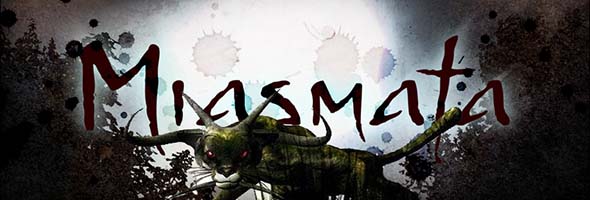
While looking for new survival horror games on Steam, I stumbled onto a very intriguing title: Miasmata. During my holiday break from work, I decided to boot up the game and see if it scratched my survival horror itch.
It didn't, on account of not actually being a survival horror game. But what I found instead was an equally interesting premise that immediately caught my attention and piqued my curiosity.
The Johnson brothers kept this game about as simple as it could possibly be (perhaps to its detriment). They had a core concept, and they stuck to it. As such, Miasmata is a very novel game. It is probably the only game that I've ever played that is solely about scientific research.
The end goal is to cure a disease that the character has contracted and then escape the island. This disease acts as the central challenge to the game: you have to periodically medicate yourself in order to control the symptoms, but all medications must be derived from the local flora. Failure to do so can slow you down, blur your vision, and eventually kill you. A sheer majority of the game, thus, consists of wandering around the island collecting samples of plants, and then returning them to the nearest laboratory to examine them and use them to concoct various potions. In addition to medicines, you can also create potions to enhance your physical strength and perception. Doing so will allow you to run and swim further, and allow you to always know your location on the map (respectively).
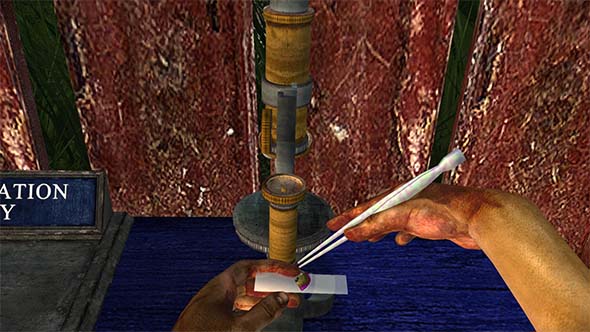
Stand back! I'm about to do SCIENCE!
Unfortunately, the process of analyzing the specimens is automated (via a skip-able cutscene). You don't actually have to do anything in order to figure out what the plant's effects are going to be, and no actual scientific knowledge is required by the player. Each plant also only has one effect, so the potion-making mechanic (which is the core of the game) is pretty shallow.
The effects of each plant will be noted in your journal, which is one of the best journal features of any game that I've ever played. It has a handy status page that includes pockets for storing your medicines, as well as holding your water flask. It also shows your objectives and has tabs to collected notes, your research results, and the map. The journal is also populated with hyperlinks that take you to the journal page with the relevant information. For example, if you find a note with ingredients for an objective drug, the status page will add a hyperlink to that note underneath the objective. It's every bit the journal that Silent Hill: Downpour wanted to have!
As you explore, you'll also find camps left behind by the deceased research team. These camps can contain notes that can reveal bits of backstory, provide recipes for various potions, or point you in the direction of key plant specimens. The camps also act as safe places for you to restock your supplies (including water), rest, and save your progress.
Keeping yourself hydrated and rested is important, as failure to do so can aggravate the symptoms of your illness and potentially kill you. Unfortunately, the feedback for this isn't terribly great. You'll get a notification when you're thirsty, but the game doesn't bother to tell you that you're tired. Instead, your health just starts rapidly deteriorating for no apparent reason. It took me a while to figure out that it was due to a lack of sleep.
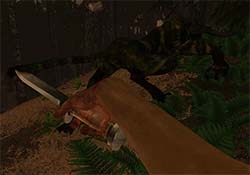
Combat mechanics are present,
but they don't have any affect.
A curious omission is that you don't have to eat. The game even includes various weapons scattered around the island, and there is an attack and throw command. But you can't attack the hostile panther-like creature that occasionally appears to hunt you, nor can you hunt and kill any of the game's various wildlife (beetles, squirrels, birds, and so forth). So you can only run and hide from the creature, and you only collect plants, which don't need to be attacked in order for specimens to be collected. So why are the weapons and attack mechanic even in the game?
Probably the second most significant mechanic is the map triangulation feature. Instead of revealing the map passively as you walk through it, the player must actively identify the location of landmarks ... [More]
d991856a-87f2-4dc9-8a5d-e20c1a004113|0|.0
Tags:Miasmata, IonFX, Bob Johnson, Joe Johnson, Steam, indie gaming, survival, action, adventure, horror, island, science, laboratory, specimen, sample, chemistry, map, compass, cartography, triangulation
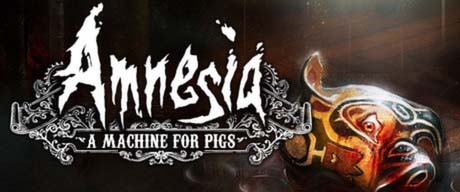
Is Frictional Games working on a new IP? I'm a bit curious as to why they outsourced development of the aptly-named A Machine for Pigs to the third-party developer The Chinese Room. Frictional's staff did stay on as "producers" for this game, so I'm sure that the final product is still consistent with what Frictional would have wanted if they had developed it themselves, and I think the overall story was still written by people at Frictional (but I could be wrong on that account). In any case, the change in development team has certainly had a dramatic effect on the way that the new game plays. The very core gameplay of exploring a linear dungeon with a flashlight is retained, but all the mechanics and the underlying feel of the game are completely different than its predecessor. This isn't necessarily a bad thing, as Amnesia: the Dark Descent wasn't perfect.
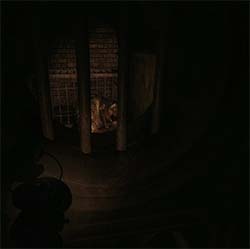
Once again, the underlying premise that sets up Amnesia: a Machine for Pigs is that your character wakes up in a mansion with no memory of who he is or why he is there. Your early exploration of the mansion reveals some vague threat, and you are forced to descend into a deep dungeon in order to discover who you are and resolve the threat. Along the way, you'll encounter deformed creatures and collect notes and documents from your former self explaining the situation, as well as have the occasional hallucinatory flashback as your memory slowly returns. But if you're worried that this sounds too much like the previous game, then fear not: A Machine for Pigs takes an entirely different approach to the gameplay and has a totally different feel to the entire experience. [More]
d070d945-e6da-4541-a97f-8240050b5cc7|1|4.0
Tags:Amnesia: a Machine for Pigs, Amnesia: the Dark Descent, review, the Chinese Room, Frictional Games, Steam, Victorian, England, industrial, survival, horror, survival horror, mansion, amnesia, Battle of the Somme, Silent Hill, Silent Hill Shattered Memories, Resident Evil, checkpoint, indie gaming

Are you as sick of zombies as I am? They're everywhere. Perhaps the real zombie apocalypse won't be caused by radiation or a genetically-engineered plague; it will be caused by media corporations drowning our brains in zombie entertainment until we all go crazy and start eating each other.
Table of Contents
Fungus zombies
OK, sure, the creatures in Naughty Dog's latest adventure game, The Last of Us, aren't actually "zombies", they are humans infected with a fictionalized variation of Ophiocordyceps Unilateralis. But they're functionally the same thing. The "infected", as they are known as in the game, are mindless, mutated monsters that shamble around and eat any human they become aware of. And if they bite you, you become infected and the fungus takes over your brain, turns your flesh into spore-producing tendrils, and makes you a cannibal.
[LEFT] An ant infected with cordyceps.
[CENTER] A moth infected with cordyceps.
[RIGHT] A human infected with cordyceps, as depicted in The Last of Us.
The game takes place 20 years after the sudden outbreak of the human cordyceps infection that leads to the death of the protagonist's daughter. Society has collapsed into ruin, with the surviving 40% of people (including the protagonist, Joel) concentrated in quarantined ghettos in the remains of major cities. Joel is working as a smuggler, bringing food, weapons, and supplies into the Boston quarantine zone to be sold on the black market, and he is tasked with escorting a young girl, named Ellie, to a research lab out west. Ellie is unique in that she seems to be immune to the cordyceps infection. She was bitten weeks ago, and has suffered nothing more than some ugly skin lesions near the bite; whereas, everyone else begins to turn into a zombie within hours of being infected. This, of course, makes her survival paramount, and Joel must do whatever it takes to ensure her safe arrival at the lab so that the researchers can hopefully study her to find a cure or vaccine. [More]
b37fff55-ed98-484c-be2f-cd521976fb05|5|5.0
Tags:The Last of Us, Naughty Dog, Sony, PlayStation 3, PS3, review, action, adventure, platformer, survival, horror, survival horror, Joel, Ellie, cordyceps, fungus, cordie, zombie, ethics, morality, Hippocratic Oath, ludonarrative, Uncharted, Silent Hill 2, Resident Evil 4
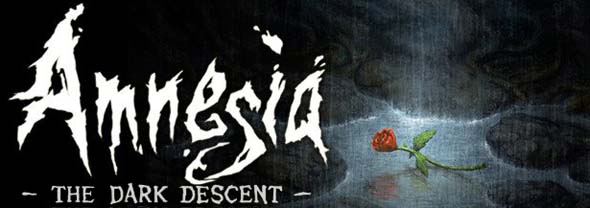
Since Silent Hill Downpour failed miserably to scratch my survival horror itch, I’ve been looking for something else to fill that niche. I picked up Amnesia: the Dark Descent on a Steam sale for pocket change, and am very glad that I did.
Mainstream game companies don’t seem particularly interested in releasing good survival horror games. It’s a very niche market and difficult to find mass-market appeal. Modern horror games mostly ape off of Resident Evil 4 by being designed as an action shooter first, and survival horror game second (if at all). The genre is dominated by fast-paced "boo"-scare games like Dead Space and F.E.A.R., and gone are the days of the deliberately-slow-paced psychological games like Silent Hill 2 and Fatal Frame. The "survival" element has mostly fallen away since resource management is widely regarded as too tedious, and the "horror" is usually just represented with difficult combat.
But where mega-publishers and AAA developers have dropped the ball, the Indie market filled in the gap 3 years ago (Sept 2010) with Amnesia: the Dark Descent.
Amnesia goes to the opposite extreme as Resident Evil 4 and Dead Space. This game is not an action game. [More]
dcd7f8cf-6f87-43f5-bf47-23ebe40b5ba4|3|4.7
Tags:Amnesia: the Dark Descent, Frictional Games, Steam, PC, H.P. Lovecraft, review, steampunk, survival, horror, survival horror, macabre, amnesia, sanity, Silent Hill Downpour, Silent Hill Shattered Memories, Dead Space, Resident Evil 4, Eternal Darkness, checkpoint, indie gaming
This review was originally published 06/21/2010 on Game Observer (now defunct as of 05/13/2014). It has been republished here for archival purposes.
I originally tried to review this game in the shoes of an objective game critic instead of a Silent Hill fan. As such, I was far too generous to it. In the time since the game's release, my opinions of it have changed dramatically, and I'm a big enough boy to admit when I'm wrong. Thus, I will include updated commentary in areas of this review where my opinion has changed, and I will not disregard my fandom for the sake of mass appeal. :/
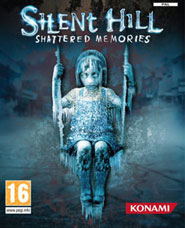
Climax perfectly poorly mixes the premise of the first Silent Hill with the psychological story-telling of Silent Hill 2 while laying the foundation for new "Horror" gameplay mechanics.
I’m a long-time fan of Silent Hill. I started with Silent Hill 2, which is my favorite game to date, and eventually made my way through the first game all the way up to the PSP’s Origins and last year’s craptacular Homecoming. I was very bothered to hear that Konami had disbanded the team that had worked on the first four games after the mixed critical and fan reception of The Room, and gave the development to a new team. Developers Double Helix and Foundation 9 completely dropped the ball with Homecoming, but Climax did a passable job with the story of Origins (even though the gameplay mechanics weren’t all that great) and Climax did a horrible job with Origins as well.
As you’re probably already aware, Shattered Memories is a re-imagining of the first Silent Hill game. It is NOT a port, nor is it a remake. Harry Mason gets in a car crash in the outer edge of the town of Silent Hill and wakes up to find his seven-year-old daughter, Cheryl, missing. He’ll proceed to explore the town of Silent Hill to find her, and along the way, meet several interesting annoying characters including a police officer named Cybil Bennett. But the similarities end there. [More]
ce74f430-6c69-40c8-8e6a-1f362ceb5c93|6|3.3
Tags:Silent Hill Shattered Memories, review, Silent Hill, Climax Studios, Konami, survival, horror, survival horror, PS3, PSP, Wii, Harry Mason, Cybil Bennett, fan fiction
|

| 12 | | | | | | | 60 | | 11 | | | | | | | 55 | | 10 | | | | | | | 50 | | 09 | | | | | | | 45 | | 08 | | | | | | | 40 | | 07 | | | | | | | 35 | | 06 | | | | | | | 30 | | 05 | | | | | | | 25 | | 04 | | | | | | | 20 | | 03 | | | | | | | 15 | | 02 | | | | | | | 10 | | 01 | | | | | | | 05 |
|